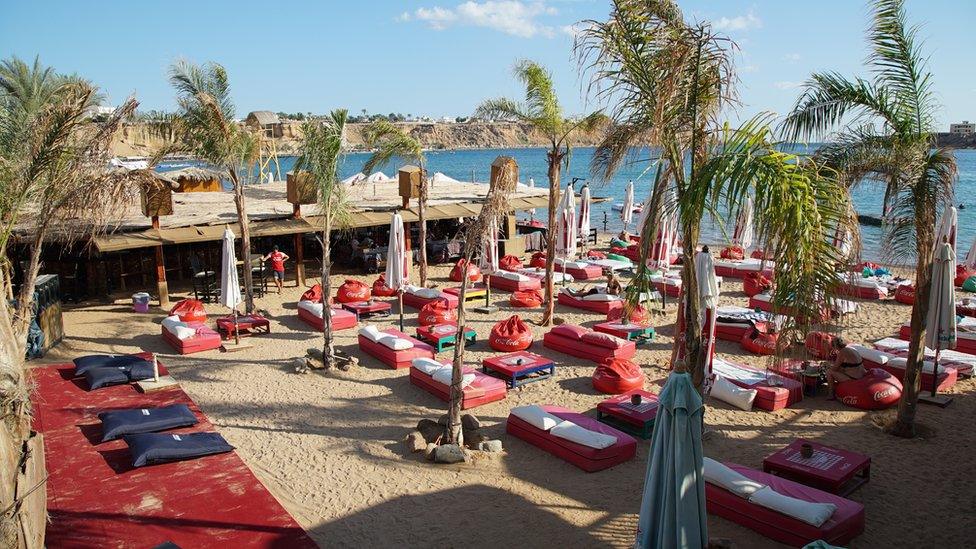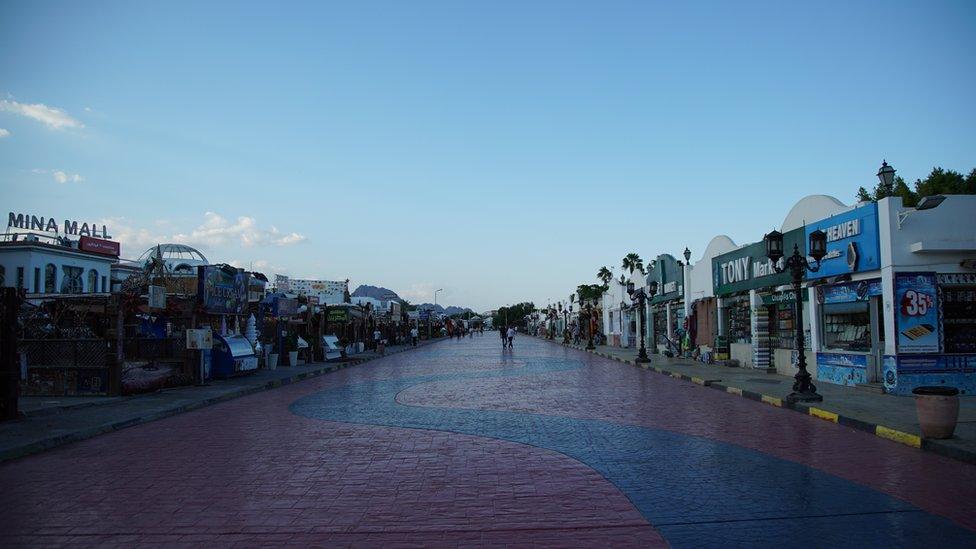Egypt tourism teeters after Sinai plane crash
- Published

Normally busy, the sun loungers of Sharm el-Sheikh now lie empty
The warm, turquoise sea glimmers tantalisingly as it laps at sandy beaches surrounded by palm trees and colourful, exotic flowers.
Ordinarily in November, few sun loungers would be unoccupied under the umbrellas that line the shores of Sharm el-Sheikh.
Most would be filled with Russian and British holidaymakers escaping the cold weather at home.
But now most tourists have disappeared.
"The beach is empty. It was full until a few days ago but the Russians have all gone," says Richard Bourne from Wales, who is here sunbathing with his wife.
"I feel so sorry for the people," he goes on. "I don't know how the hotels will survive the coming weeks."
Not far away, the bars and clubs of Naama Bay pump out loud music to ever-diminishing numbers of customers. Souvenir sellers and diving tutors sit idle with worried expressions.
"There's no business," bemoans Raed, who runs a store selling Pharaonic knick-knacks - from plastic scarabs to papyrus scrolls - that are usually popular with European visitors.
Redundancy fears
The resort is increasingly deserted after the plane crash which led the UK, Russia and several other countries to suspend flights here.
All 224 people onboard a Russian charter jet were killed when it came down over the north of the rugged Sinai peninsula on 31 October.
Sharm el-Sheikh is regarded as Egypt's 'tourism jewel'
Suspicions that a bomb could have been planted onboard have raised concerns about security at Sharm el-Sheikh airport.
In recent days, airlines have made special arrangements to fly out tens of thousands of passengers - without bringing in new arrivals.
"On a normal basis we would be 90% full right now, everyone would be working and everyone would be happy," says Amr Darwish, an owner of the Terrazzina beach club.
He worries he might have to lay off staff in the near future.
"We don't know when the tourists are going to be able to come back. You can't make a business plan for next week, let alone next month or next year," he adds.
According to the tourism ministry, Egypt stands to lose 2.2bn Egyptian pounds ($280m) a month after the cancellation of flights from Russia and Britain.
Two-thirds of tourists to Sharm el-Sheikh come from these two countries. The destination earns about a third of Egypt's total proceeds from tourism.
Economic impact
It was able to recover from previous shocks, including a series of deadly militant bombings along the Red Sea coast between 2004 and 2006 and a killer shark attack.
In the political turmoil since the 2011 uprising, which overthrew the long-time leader, President Hosni Mubarak, the resort has proven resilient compared to other popular attractions like the Giza Pyramids and Luxor.
Yet with the Egyptian economy still in a fragile state, the effects of the latest setback will be deeply felt.
Workers in Sharm el-Sheikh - from taxi drivers to hotel receptionists - come from across the country and send salaries home. Tourism is a vital source of foreign currency.

Thousands of tourists have been flown home since the crash
"This couldn't have come at a worst time," says Angus Blair of the Signet Institute, a Cairo-based economic think-tank.
"Egypt needs this [resort] economically in terms of employment and foreign exchange revenues.
"It will definitely damage sentiment and lead to problems at the central bank because clearly they're already under stress trying to access foreign currency for trade."
This week a senior Russian official warned it would take "several months, as a minimum" for Russian flights to Sharm el-Sheikh to resume as the investigation into what caused the crash continues.
He said it would be impossible to radically revise Egypt's security system quickly.
Recovery hopes
Concerns have been raised about baggage scanning procedures and searches at an entry gate for food and fuel for aircraft at Sharm el-Sheikh airport.
There are some hopes that in the short-term, Arab tourists and those from central Europe can be attracted to the resort in greater numbers.
However most business owners accept the reality is that they must brace themselves for another tough period ahead.
"It will take us time to recover but a place like this never dies," says Mr Darwish. "It's a nice resort with great weather. We have the sea, the corals, the desert. It's magical."
The Bournes, visiting from Wales, also believe in the enduring appeal of Sharm el-Sheikh - even though their holiday has been overshadowed by the plane crash which happened a day after they arrived. Their return home has been delayed by at least a day.
"This could happen anywhere, couldn't it?" Jenny Bourne comments stoically.
"I would come back again next year," her husband, Richard, says. "They just need to sort that airport out."
Egypt is counting on other tourists adopting a similar attitude.